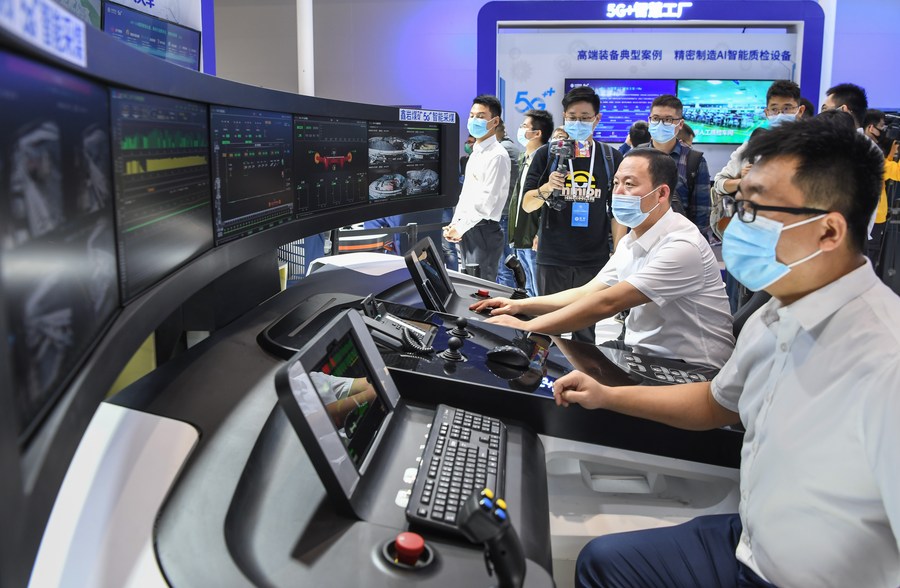Industrial internet becoming a catalyst for innovation in nation
China will continue to expand global communication and cooperation in the industrial internet sector, which is fast becoming the go-to sector for innovation in the country, senior officials said on Tuesday.
China will continue to expand global communication and cooperation in the industrial internet sector, which is fast becoming the go-to sector for innovation in the country, senior officials said on Tuesday.

Members of staff demonstrate a 5G-powered coal-mining system at an exhibition during the "China 5G + Industrial Internet Conference" in Wuhan, Hubei province, on Nov. 19, 2020. [Photo/Xinhua]
More than 1,100 5G-plus industrial internet projects have been set up in the country due to the rapid advances in the 5G sector. In addition, industrial internet projects are now present in more than 30 key sectors like energy, transportation and medical services in the country, said Liu Liehong, vice-minister of industry and information technology.
However, a lot remains to be done to guide the conventional industry onto the high-quality development path, especially through its integration with digitalization, networking and intelligent development, he said.
"To achieve these targets, it is necessary to strengthen innovation, boost infrastructure capabilities and accelerate the integration and application of technologies with steady opening-up," said Liu.
"We welcome global enterprises and organizations to actively participate in China's industrial internet development. We are currently drafting the plans for the next stage of industrial internet innovation and we believe that our collaborations will foster global industrial internet innovation and development," he said.
Surveys conducted on the industrial internet applications of more than 1,200 enterprises have shown that 71.44 percent of the respondents have switched to at least one new model, which effectively promotes industrial transition, upgrade and integrated development, said Liu.
Zhao Zeliang, vice-minister of the Cyberspace Administration of China, the nation's top internet regulator, said due to the novel coronavirus epidemic, sectors like online education, work from home and cross-border e-commerce have seen steady growth and this has laid the foundations for the sound development and application of the industrial internet sector.
The integration of industrial internet with various processes that range from research and development, design, manufacturing, operations, to management, examination and maintenance, and product related services will maximize efficiency and minimize resource consumption for various industries, and further promote the modernization of related industrial chains, said Zhao.
Various other officials and industrial experts also shared their views during the Innovations and Breakthroughs for Industrial Internet sub-forum at the World Internet Conference-Internet Development Forum on Tuesday in Wuzhen, Zhejiang province.
Nan Cunhui, chairman of the board at Chint Group, an electrical components manufacturer from China, believes that digitalization will be the new engine for future development in the country.
"Industrial internet will enable manufacturers to adopt new technologies, new models to become intelligent, and the digitalization process will develop a brand-new ecosystem ready for higher quality development," he said.
Nan said that the global supply chain is currently restructuring and Chinese manufacturers should seize the opportunity for their development.
Thomas Donato, senior vice-president of Rockwell Automation, a US-based provider of industrial automation power, control and information solutions for manufacturers, said that digital transformation has improved the annual production efficiency of Chinese manufacturers by more than 5 percent over the past decade. Augmented reality technologies will shorten the onboard time of employees by 40 percent and improve the product quality significantly, he said.
Although China has taken great digital transformation strides, its development has been hampered by talent shortage and insufficient coordination, said Donato.
He Biao, vice-general manager at China United Network Communications Group Co Ltd or China Unicom, said most of the existing intelligent manufacturing projects are successful collaborative efforts of the industrial chain and the ecosystem as a whole.
Stephen Mellor, chief technical officer of the Industrial Internet Consortium, said cross-industry deployment of industrial internet in manufacturing, energy, automotive and healthcare sectors will help its integration with 5G, AI and digital technologies.

